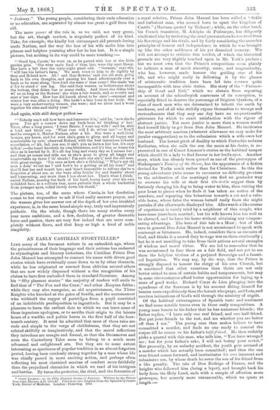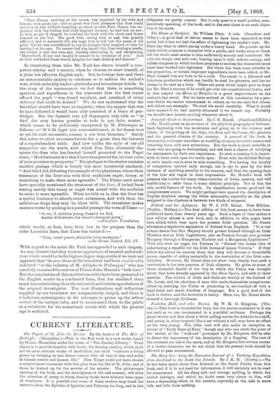AN EARLY CASTILIAN STORYTELLER.* LIKE many of the foremost writers
in an unbookish age, whom the primitiveness of their language and their notions has endeared to etymologists and literary historians, the Castilian Prince Don John Manuel has attempted to connect his name with divers good stories which have eventually come down to us by other channels, while he has originated or rescued from oblivion several others that are now widely dispersed without a due recognition of his claims to have first embodied them in standard literature. Among his " fifty pleasant stories " the majority of readers will smile to find that of "The Fox and the Crow," and other 2Esopian fables; while they may also recognize, as old acquaintances, the Three Knights who knocked at the gates of Seville, and the necromancer who withheld the supper of partridges from a pupil convicted of an indubitable predisposition to ingratitude. But it may be a pleasure to learn the earliest date to which we can trace some of these ingenious apologues, or to ascribe their origin to the leisure hours of a warlike and politic baron in the first half of the four- teenth century. It must be admitted that most of these tales are rude and simple to the verge of childishness, that they are not related skilfully or imaginatively, and that the moral reflections they introduce are meagre and formal, so that the Decameron and even the Canterbury Tales seem to belong to a much more advanced and enlightened era. But they, are to some extent interesting as specimens of popular tradition in an almost forgotten period, having been carelessly strung together by a man whose life was chiefly passed in more exciting action, and perhaps often reflecting his most cherished maxims of conduct more faithfully than the prejudiced chronicles in which we read of his intrigues and battles. By turns the protector, the rival, and the favourite of
• Count Lueanor ; or, the Fifty Pleasant Stories of Patronio. Written by the Prince Don Juan Manuel. A.D. 1835-47. First done into English from the Spanish by James York, Doctor of Medicine. London: Pickering. 1868.
a royal relative, Prince John Manuel has been called a " fickle and turbulent man, who seemed born to upset the kingdom of Castile" (Mariana quoted by Ticknor) ; while, on the other hand, his French translator, M. Adolphe de Puibusque, has diligently vindicated him by reviewing the cruel provocations he received from his Sovereign and his rivals, and by fairly considering the anarchic principles of honour and independence in which he was brought up like the other noblemen of his yet disunited country. We will not attempt to criticize this verdict, of which the historical grounds are very slightly touched upon in Mr. York's preface ; but we must own that the Prince's compositions seem plainly to indicate a man of much sincerity, sense, and magnanimity, who has, however, made honour the guiding star of his life, and who might easily in following it by the glasses of aristocratic tradition have been led into courses quite incompatible with true civic duties. His story of the " Partner- ship of Good and Evil," which we abstain from repeating on account of the schoolboyish coarseness of its conception, is especially fitted to deserve the patronage of litigious Quakers, of a class of meek men who are determined to inherit the earth by meekness, and of all who stolidly expose themselves to wrongs and encroachments that they may one day have an unquestionable grievance for which to exact satisfaction with the rigour of abstract justice. Yet mere justice is more than a woman would find herself likely to get from Don John Manuel. He inculcates the most arbitrary maxims (whatever allowance we may make for jocular exaggeration) as to the submission which a wife owes her husband. The lowest pitch of docility to which Petruchio reduces Katherine, when she calls the sun the moon at his desire, is re- presented in one of Count Lucanor's stories as the habitual temper which should fit a lady to find favour in her lord's eyes. Another story, which has already been quoted as one of the prototypes of Shakespeare's Tenting of the Shrew, has the appearance of a fiction devised for Turks much rather than for Christians. In this the young adventurer (who seems to encounter no difficulty previous to the celebration of the marriage) can find no genteeler way to overawe his wife at their first tote-h-tote supper than by furiously charging his dog to bring water to him, then cutting the poor beast to pieces when he finds it has taken no notice of the mandate, and repeating this behaviour towards a cat and a valu- able horse, whose fates the woman herself really fears she might partake if she afterwards disobeyed him. Afterwards a like course of experiment is vainly tried by a neighbour of this couple, who have some years been married ; but his wife knows him too well to be alarmed, and he loses his horse without obtaining any compen- sating advantage. The hero of this tale is a Moor ; but of that race in general Don John Manuel is not accustomed to speak with contempt or bitterness. He, indeed, considers them as enemies of God, and thinks it a sacred duty to wage war on them continually ; but he is not unwilling to take from their actions several examples of wisdom and moral virtue. We are led to remember that he was accustomed to face them on a fair field, and not yet to see them the helpless victims of a perjured Sovereign and a fanati- cal Inquisition. We may say, by the way, that the Prince is. strongly disposed to honour the clergy of his own Church, but is convinced that other vocations than theirs are not only better suited to men of certain habits and temperaments, but may in some circumstances afford better opportunities for laying up a store of good works. Richard Coeur de Lion plunging into the squadrons of the Saracens is by his account fitting himself for heaven more expeditiously than the hermit who prays, and fasts, and receives intimations of God's will through the ministry of angels.
Of the habitual extravagance of Spanish taste and sentiment we find some notable traces even in these early compositions. A. young man boasts to his father that he has numerous friends; the father replies, "I have only one real friend, and one half-friend. But put your friends to the test, and see whether you are better off than I am." The young man then makes believe to have committed a murder, and finds no one ready to conceal the corpse till he comes to his father's half-friend. He then unfairly picks a quarrel with this man, who tells him, " You have wronged me ; but for your father's sake, I will not betray your secret." But presently, by an unlucky accident, the youth gets accused of a murder which has actually been committed ; and then the one true friend comes forward, and incriminates his own innocent and submissive son, by whose death he saves the son of his friend from a like penalty. The tale of Don Rodrigo of France, and the knights who followed him (being a leper), and brought back his body from the Holy Land, ends with a sample of affection more grotesque, but scarcely more unreasonable, which we quote at I length:—
"Pero None; arriving at his house, was received by his wife and friends with great joy ; and so great was their pleasure that they could not look at him without laughing, so much so that Pero Nunez was im- pressed with the feeling that they laughed because he had lost an eye : so with an air of chagrin ho covered his head with his cloak and threw himself on the bed. His good wife, seeing him so sad, was greatly afflicted, and so earnestly did she urge him to tell her the cause of his _grief, that he was constrained to say he thought they laughed at him for having lost his eye. No sooner had she heard this, than seizing a needle, she thrust it into her own eye, thereby destroying it, and exclaiming, `Henceforth, if any one laughs it cannot be in contempt of you!' And so God rewarded these trusty knights for their fidelity and honour."
In translating these tales Mr. York has shown himself a corn- latent scholar and a master, when he chooses to exert himself, of a plain but effective English style. But he betrays here and there an unaccountable anxiety to condense or to enliven the author's text, which unluckily leads to platitudes and inconsistent details. In the story of the necromancer we feel that there is something spurious and superfluous in the statement that the first repast .offered the pupil " was found excellent, and consisted of every delicacy that could be desired." We do not understand why the breakfast should have been so exquisite, when the supper that was to have followed it would have only consisted of a brace of par- tridges. But the Spanish text (of Gayangos) only tells us " et Ezol' dar muy buenas posadas et todo lo que hobo mester," -which seems to be judiciously interpreted by M. Puibusque as follows :—" 11 le fit loger tres convenablement, et lui donna tout
• ce qui lui 6tait necessaire, comme It son hote bienvenu." Surely this refers to other accommodations for a guest than the luxuries
• of a superabundant table. And how unlike the style of our old storyteller are the words with which Don Elan ultimately dis- misses the dean who has fancied himself promoted to the Papal -chair, " How fortunate is it that I have thus proved the intrinsic value -of your promises in prosperity." The prologue to the stories contains another passage which is tersely but most incorrectly rendered, " And this I did, following the example of the physicians, whom their treatment of the liver mix with their medicines sugar, honey, or aomething to make them more agreeable." The Prince need never have specially mentioned the treatment of the liver, if he had been .stating merely that honey or sugar was mixed with the medicine to make it more agreeable. What he tells us is, that the liver has -a special tendency to absorb sweet substances, and with them the :salubrious drugs they may be blent with. The translator makes matters worse by quoting as a parallel passage the verse of Tasso :- " So we, if children young diseas'd we find,
Anoint with sweets the vessel's foremost parts," —Fairfax's Translation, -which would, at best, have been less to the purpose than the older Lucretian lines, that Tasso has imitated:—
" Nam, veluti pueris absintbia tetra medentes."
—De Rerum Naturd, Lib. IV.
With regard to the notes Mr. York has appended to each chapter, we may observe that they wear an appearance of research and erudi- tion which would be in the highest degree respectable if we were not apprised that "in some them of the translator had been considerably indebted " to the industry of M. Adolphe de Puibusque," who has -carefully examined the sources of Prince John Manuel's "folk-lore." But the conclusions of this meritorious critic have been presented to the English reader in a condensed form, that has rendered them much lessentertaining than the animated and curious speculations of the original investigator. The new illustrations and reflections supplied by our translator are comparatively insipid, and there is a ludicrous extravagance in his attempts to praise up the artless naivete of the antique tales, and to recommend them to the public as a substitute for the sensational novels with which the present age is surfeited.



































 Previous page
Previous page